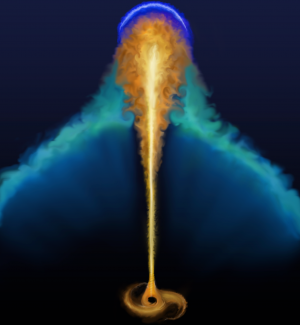Difference between revisions of "Electromagnetic counterpart of GW events"
(Created page with "thumb") |
|||
| Line 1: | Line 1: | ||
[[File:Jet.png|thumb]] | [[File:Jet.png|thumb]] | ||
| + | With the joint detection of GW170817/GRB170817 we had for the first time the confirmation that short GRBs are associated to the coalescence of compact binaries. Such epochal discovery opened the door for a revolutionary era for astronomy.<br> | ||
| + | |||
| + | In our group we work on solving open issues about GRB physics, with both a theoretical and an observational approach. The jet launching mechanism, the jet structure, particle acceleration, emission and dissipation processes are all open points in the GRB field, which need to be addressed. The exploitation of multi-wavelength data from different observatories (from radio to γ-rays) is necessary to fully characterise the spectral and temporal properties of these enigmatic objects. A complete and extensive exploration of the GRB phenomenology is of cardinal importance to establish the optimal observational strategy for current and next-generation astronomical facilities, in synergy with gravitational wave observatories. The optimisation of joint detection strategies relies on the knowledge of GRB population properties, which, for the sub-class of short GRBs, is still incomplete and needs to be refined.<br> | ||
Revision as of 16:11, 8 April 2021
With the joint detection of GW170817/GRB170817 we had for the first time the confirmation that short GRBs are associated to the coalescence of compact binaries. Such epochal discovery opened the door for a revolutionary era for astronomy.
In our group we work on solving open issues about GRB physics, with both a theoretical and an observational approach. The jet launching mechanism, the jet structure, particle acceleration, emission and dissipation processes are all open points in the GRB field, which need to be addressed. The exploitation of multi-wavelength data from different observatories (from radio to γ-rays) is necessary to fully characterise the spectral and temporal properties of these enigmatic objects. A complete and extensive exploration of the GRB phenomenology is of cardinal importance to establish the optimal observational strategy for current and next-generation astronomical facilities, in synergy with gravitational wave observatories. The optimisation of joint detection strategies relies on the knowledge of GRB population properties, which, for the sub-class of short GRBs, is still incomplete and needs to be refined.
